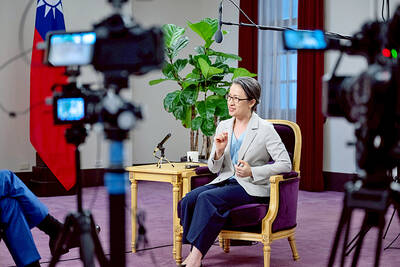The National Youth Commission is promoting domestic travel tours this summer for both local and foreign youths, with excursions in Mandarin, English and even Japanese.
The commission is offering 20 tours planned by various non-profit organizations (NPOs), such as community colleges and art and culture associations for youths from between the ages of 15 and 30.
They will mainly center around local art and history, lifestyles, ecology and Aboriginal village tours.
National Youth Commission Chairwoman Cheng Li-chun (
English tours will include a Yunlin farm life camp, Beitou and Yangmingshan nature tours, Pingtung Wutai (霧台) Village Aboriginal tours and Chiayi countryside tours.
The Chiayi tour is also available in Japanese.
Another option, the Tarumak (
The Aborigines of Taiwan speak languages belonging to the Austronesian language family.
Chang Chun-lien (張春蓮), an official in charge of the project at the commission, said that this was the second year the commission was offering these tours.
Last year, there were fewer options and very few foreigners participated since language was a problem, Chang said.
However the commission encouraged NPOs to offer English tours this year for foreigners who have just come to Taiwan and do not understand enough Mandarin to go on a normal tour, she said.
The commission provides extra subsidies for organizations that offer tours in foreign languages, she added.
Foreigners were welcome to participate in all tours and not just the English ones, Chang said.
The cost of the tours ranges from NT$500 to NT$6000 and last for two to five days.
More information about the tours and on how to register can be found on the commission's Web site at youthhub.net.tw/youthtravel/.

China might accelerate its strategic actions toward Taiwan, the South China Sea and across the first island chain, after the US officially entered a military conflict with Iran, as Beijing would perceive Washington as incapable of fighting a two-front war, a military expert said yesterday. The US’ ongoing conflict with Iran is not merely an act of retaliation or a “delaying tactic,” but a strategic military campaign aimed at dismantling Tehran’s nuclear capabilities and reshaping the regional order in the Middle East, said National Defense University distinguished adjunct lecturer Holmes Liao (廖宏祥), former McDonnell Douglas Aerospace representative in Taiwan. If

TO BE APPEALED: The environment ministry said coal reduction goals had to be reached within two months, which was against the principle of legitimate expectation The Taipei High Administrative Court on Thursday ruled in favor of the Taichung Environmental Protection Bureau in its administrative litigation against the Ministry of Environment for the rescission of a NT$18 million fine (US$609,570) imposed by the bureau on the Taichung Power Plant in 2019 for alleged excess coal power generation. The bureau in November 2019 revised what it said was a “slip of the pen” in the text of the operating permit granted to the plant — which is run by Taiwan Power Co (Taipower) — in October 2017. The permit originally read: “reduce coal use by 40 percent from Jan.

‘SPEY’ REACTION: Beijing said its Eastern Theater Command ‘organized troops to monitor and guard the entire process’ of a Taiwan Strait transit China sent 74 warplanes toward Taiwan between late Thursday and early yesterday, 61 of which crossed the median line in the Taiwan Strait. It was not clear why so many planes were scrambled, said the Ministry of National Defense, which tabulated the flights. The aircraft were sent in two separate tranches, the ministry said. The Ministry of Foreign Affairs on Thursday “confirmed and welcomed” a transit by the British Royal Navy’s HMS Spey, a River-class offshore patrol vessel, through the Taiwan Strait a day earlier. The ship’s transit “once again [reaffirmed the Strait’s] status as international waters,” the foreign ministry said. “Such transits by

Taiwan is doing everything it can to prevent a military conflict with China, including building up asymmetric defense capabilities and fortifying public resilience, Vice President Hsiao Bi-khim (蕭美琴) said in a recent interview. “Everything we are doing is to prevent a conflict from happening, whether it is 2027 or before that or beyond that,” Hsiao told American podcaster Shawn Ryan of the Shawn Ryan Show. She was referring to a timeline cited by several US military and intelligence officials, who said Chinese President Xi Jinping (習近平) had instructed the Chinese People’s Liberation Army to be ready to take military action against Taiwan